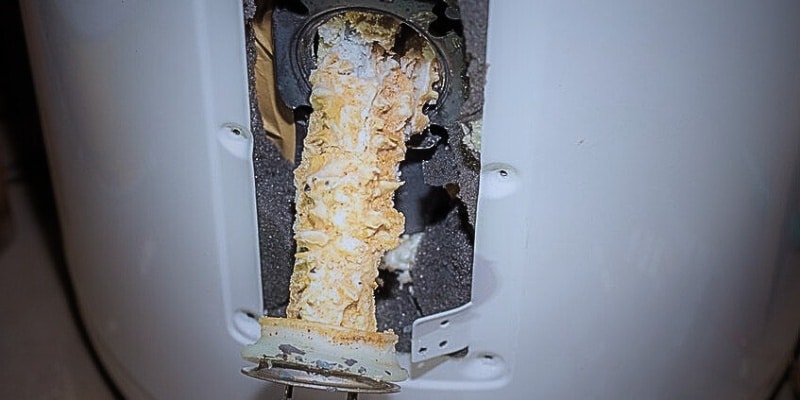So, you’ve caught your water heater making a high-pitched noise. I get it; our home gadgets have quirky ways of grabbing our attention. But here’s the thing – while a little humming from the fridge or a soft click from the AC might be standard fare, a noise from your water heater isn’t. High-pitched noise from the water heater can be a sign of significant issues.
It’s like your heater saying, “Hey, I need some attention here!” And trust me on this: ignoring that plea isn’t the best idea. These small warnings, if ignored, could lead to a bigger, pricier headache down the line.
My advice? Don’t wait for the encore. Give a plumbing expert to inspect your water heater. It’s always better to play it safe, especially when it comes to our trusty water warmers.
Common Reasons for a High-Pitched Noise from Water Heater
From personal encounters and stories shared by others, that high-pitched noise can be downright vexing. Let’s delve into the primary culprits, shall we?
Sediment Buildup
Water, especially if it’s hard, carries minerals like calcium and magnesium. As the water heats and re-heats, these minerals precipitate and settle at the bottom of the tank. This is like the kettle developing a limescale layer over frequent use.

- More on how to drain and flush water heater; Click Here
This accumulated sediment can act as a barrier, preventing efficient heat transfer. As a result, the heating system has to work overtime, causing it to overheat. This extra work creates that bothersome high-pitched sound. It’s like your water heater is grumbling about the extra weight it has to carry!
Valve Problems
The valve, specifically the temperature pressure relief (TPR) valve, is designed to release excess pressure from within the tank to prevent possible explosions.
If this valve becomes faulty, gets stuck, or is obstructed, it might not release the pressure as intended. This buildup of pressure can cause a whistling sound akin to a kettle reaching its boiling point. More than the noise, it’s a safety hazard because if left unchecked, the excessive pressure might damage the tank or even lead to a burst.
Can a malfunctioning valve be repaired, or should it be replaced?
Often, it’s safer and more efficient to replace a faulty valve.
Water Pressure Issues
Every water system has a certain pressure, ensuring water reaches all parts of your house. Sometimes, due to various reasons like a faulty regulator, this pressure surges.
If water rushes into the heater with excessive force, the tank and its components feel the strain. Imagine being in a room where the walls suddenly start closing in; that’s how your water heater feels. The components vibrate or resonate with this force, creating that high-pitched sound. It’s your heater’s way of saying, “Slow down! It’s too much, too fast!”
What’s the ideal water pressure for my heater?
Typically, between 50 and 60 PSI is considered optimal.
Damaged Heating Element
The heating element is akin to the heart of your water heater. It’s responsible for, well, heating the water. Over time, due to wear and tear or manufacturing defects, it might malfunction.
A malfunctioning or damaged heating element can cause irregular heating patterns. Sometimes, it might overheat in specific areas or create localized hotspots. This inconsistent heating can cause components to expand and contract unevenly, leading to that unwelcome serenade. It’s like your heater trying to signal that its core isn’t feeling right.
Understanding these problems and their root causes not only equips you to identify them but also underscores the importance of timely maintenance and checks. After all, a stitch in time saves nine!
How to Troubleshoot the Noise
Here’s what I did to tackle the noise:
- Draining the Tank: To remove the sediment, turn off the heater, connect a hose to the drain valve, and let the water out. Remember, it’s hot, so be careful!
- Checking the Valve: I ensured the valve was functioning well and releasing excess pressure.
- Monitoring Water Pressure: If water’s coming in too fast, consider installing a pressure-reducing valve.
- Examining the Heating Element: I left this to the pros, but if you’re handy, ensure it’s in good condition and replace it if necessary.
Now, while I love a good DIY, I’m also aware of my limits. If you’re unsure about any of these steps or the noise persists, don’t hesitate to call in a professional. A malfunctioning water heater can be a hazard, and it’s always better to be safe than sorry.
Summary
A high-pitched noise from your water heater is its way of crying out for help. While some solutions are straightforward, always prioritize safety and know when to call a professional.
That high-pitched whistle isn’t just a random noise; it’s a telltale sign of underlying issues. Addressing these early signs head-on not only ensures the longevity of the device but also safeguards your home from potential hazards.
Moreover, understanding the causes of these water heater noises empowers us as homeowners. It gives us the knowledge to differentiate between a minor hiccup and a major concern. Armed with this knowledge, we can make informed decisions, whether it’s calling a professional or undertaking preventive maintenance.
In the end, it’s all about attentiveness and proactive care. Remember, our appliances serve us diligently, and it’s only fair we return the favor by ensuring they’re in top-notch condition. By doing so, we not only ensure their efficiency and longevity but also our own peace of mind.






